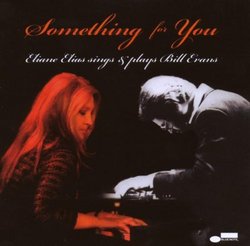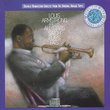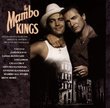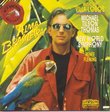| All Artists: Eliane Elias Title: Something for You: Eliane Elias Sings & Plays Bill Evans Members Wishing: 3 Total Copies: 0 Label: Blue Note Records Original Release Date: 1/1/2008 Re-Release Date: 1/15/2008 Album Type: Import Genres: International Music, Jazz, Pop Styles: South & Central America, Brazil, Brazilian Jazz, Latin Jazz, Modern Postbebop, Vocal Jazz, Bebop, Vocal Pop Number of Discs: 1 SwapaCD Credits: 1 UPCs: 400000003955, 5099951179526, 5099951420550 |
Search - Eliane Elias :: Something for You: Eliane Elias Sings & Plays Bill Evans
 | Eliane Elias Something for You: Eliane Elias Sings & Plays Bill Evans Genres: International Music, Jazz, Pop
CD > POPULAR MUSIC > JAZZ |
Larger Image |
CD DetailsSynopsis
Product Description CD > POPULAR MUSIC > JAZZ Similarly Requested CDs
|
CD ReviewsOne of her best! Kenneth Miller | Bloomsburg, PA United States | 01/19/2008 (5 out of 5 stars) "Remember "Bowing to Bud" and "Cross Currents"? Add a splash of "Thats All It Was"and "One Note Samba" and you get an idea of what's in this CD.You'll find great jazz and lush lyrical ballads. More jazz than Brazilian as you would expect in a homage to Bill Evans-and its all good and most of it great."But Not For Me", "Blue in Green"'\"I Love My Wife" "After All" "Evanesque" stand out. And I was especialy moved by "For Nenette".Mark Johnson stood out and was greatly responsible for the creation of this work. Kudos to Eliane and Mark! (Please come back to Harrisburg)" Romance and Remembrance Jinkyu | 01/09/2009 (4 out of 5 stars) "Aside from her Brazilian roots, Eliane has attributed jazz pianist Bill Evans as a major influence. It also happens that her husband, bassist Marc Johnson, played with Evans in Evans' final days. The jazz played by Evans could sometimes have romantic overtones, a key part of Eliane's persona. "Something for You" is devoted to Evans and is full of songs written or performed by him. It has a good deal of fast and slower jazz, including the bebop sound, but also a good amount of romantic piano work, both interpretative and original. The first half of the CD tends toward the jazzy, the second half toward the romantic. Drummer Joey Baron has an uneven presence; also, unlike in most of Eliane's recent work, there are no other supporting musicians save for Johnson, much less an orchestra, in any of the tracks. My dark horse favorite is Miles Davis' "Blue in Green." It is not really bebop or romantic, but has some pretty, very elegant improvisation. Recall that it was Evans who contributed the piano work on this song in Miles' classic album "Kind of Blue." Eliane's medium-paced piano is played over a slower rhythm tempo, and she does sophisticated interpretative work against the heavily horn-infused original. In addition, Eliane observes in the liner notes that it has a Brazilian feel. It touches Miles well with her own flavor, yet subtly a different sound for her. Also note that Eliane and the group honor Miles' spirit in "Solar," his other song here, with more great improvisation. Eliane's singing is better on romantic pieces, as in all her popular ones, and it is always pretty; her accent and thicker voice can get in the way when it comes to certain slow jazz singing in English. But what the hey, she sings in her lovely Portugese in the one Brazilian song, "Minha." Her piano work is great, as always. She has only one original composition -- the pretty "After All" -- but she also did major romantic rearrangements for "Evanesque," one of the highlights, and for the strong title track, for which she also created lyrics. Some of her best flowery, romantic phrasing and occasional flourishes come in "I Love My Wife" and "For Nenette," which are among her several solo piano numbers. As you can read, on a personal level I recommend this CD more for its prettier side than its traditional jazz side, just a matter of taste. As in the past, Eliane shows she is enjoyable with solo piano or piano supported only by a rhythm section. This time, the context was particularly special. " Carefully planned, professionally produced, well played. Samuel Chell | Kenosha,, WI United States | 05/21/2008 (4 out of 5 stars) "Although the urgency and intensity prove elusive, Bill Evans' harmonies, voicings, and taste come through on several selections, including the title song (a previously unreleased composition by the late pianist), "Minha," "I Love My Wife," "For Nenette," "Evanesque," and Elias' own "After All." Otherwise, this is one of those smooth, relaxing, well-produced albums (increasingly rare for jazz releases by big American labels) that at times threatens to disappear into the background (ironically, a charge that Bill had to deal with through much of his career). Elias has a full and sultry singing voice along with a charming accent, but its placement (low tenor range) is not particularly well-suited to "Waltz for Debby" (the trio at least freshens it a bit by taking it in 4/4 most of the way).
Especially with Marc Johnson (Evans' last bassist) on the date, it would have been interesting to hear more of the Evans repertoire from his last 18 months ("Nardis," "Turn Out the Stars," possibly even a vocal transcription of "Your Story" entitled "My Story"). The recording concludes with a final taped segment of Evans' own playing which, as atrocious as the audio quality is, should suggest why his was an all but unapproachable talent. On several numbers Johnson plays the bass of Scott LaFaro (who died less than a month after the seminal Village Vanguard sessions). As has been the case for the past several decades, the recorded sound of bass--while full, encompassing, and very present--tends to be lacking in "character," or "personality." It used to be easy on a blindfold test, even apart from solos, to identify the recorded sound of a Mingus, Ray Brown, Paul Chambers, Sam Jones or Scotty LaFaro. Not just on the Riverside recordings but on some of the dates for Contemporary Records with Hampton Hawes and Harold Land, LaFaro's playing is gutty, ringing, and clearly defined. The equipment was comparatively primitive (an analog tape recorder and a mic placed in front of a bass without a pick-up), but its effectiveness, as the evidence frequently shows, was inarguable. By comparison, this recording (and practically every current recording that isn't a reissue) makes the rhythm section sound highly competent but also generic. (For me this is a 3-star recording, but I can readily see the appeal of this 16-song album to many listeners, so we'll split the difference. For those interested in women tributes to Bill Evans, also check out Tierney Sutton's tribute to Bill as well as the 2-3 albums on which Ellyn Rucker both plays and sings Evans songs.)" |

 Track Listings (17) - Disc #1
Track Listings (17) - Disc #1







